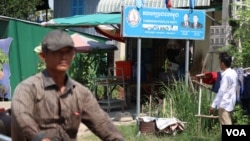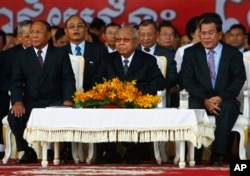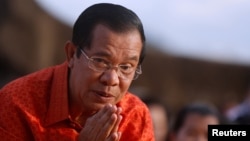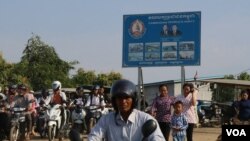On Feb. 25, seven commune councilors are going to vote in Cambodia’s Senate election, a nationwide political contest few citizens know or care much about.
The Cambodia National Rescue Party (CNRP) won a majority of commune seats here in June’s local elections.
But that was then, and this is now: The CNRP, the major opposition party, no longer exists because the nation’s top court dissolved it in November, and there is little doubt that the commune councilors will vote for the ruling Cambodian People’s Party (CPP).
In nearby Kandal Province, grocer Yim Sokhoeun sums up the Senate election by comparing the lack of opposition to a boxing match: “It’s not good unless there is an opposition party,” she told VOA Khmer. “A country without the opposition party, what does it mean? I want to have the opposition. A country without the opposition, it is difficult for people to make choices.”
Senate founded in 1999
Cambodia’s Senate was founded March 25, 1999, to break through a political impasse after the prior year’s national election. The CPP wanted to reward Prince Norodom Ranariddh, then-president of the royalist party, FUNCINPEC, for joining forces with the ruling party and made him president of the National Assembly.
But what to do with the late Chea Sim? The longtime CPP leader had been president of the National Assembly until the prince arrived.
The CPP created the Senate and put him in charge of what remains a body with the primary responsibility of reviewing legislation approved by the National Assembly.
Mam Bunneang, Senate spokesman, defended what critics call a rubber-stamp institution, saying, “We do things in accordance with the Constitution and the internal rules of the Senate.”
“Right now, the Senate performs no vital legislative function,” said Sebastian Strangio, the author of Hun Sen’s Cambodia. It was formed “simply to create a power base for Chea Sim.”
Vote every six years
Yet every six years, there’s a Senate vote. In about two weeks, 62 senators will be elected, and as the law allows, the king will nominate two senators and the National Assembly will nominate another two.
Coming five months before the national election, the Senate vote serves as another reminder of the power consolidated in the CPP and Hun Sen, one of the world’s longest-serving prime ministers, since the dissolution of the opposition CNRP.
Hun Sen has launched an extensive crackdown on independent media and civil society activists and the opposition party ahead of July’s election, moves critics see as “the death of democracy.”
So Chantha, a Cambodian political analyst, said Cambodia will become a “totalitarian country” if there are no opposition voices in the National Assembly and Senate.
“There is no balance power … and without it, democracy can’t run smoothly and effectively and it is without value,” he said.
The elected Senate seats are filled by indirect ballot — only 11,572 commune councilors and 123 National Assembly members can vote — which means senators answer to political parties rather than ordinary Cambodians. Although four parties will be on the ballot, the CPP is expected to win all 62 seats.
Discussed upcoming vote
Last month, in the Popel Commune Hall, Touch Pav, the commune chief, sat before the other commune councilors, and told them he plans to vote for the CPP.
“I am going to vote for CPP since I am from the CPP,” said Pav, 47, who assumed the chief’s post after the CNRP incumbent vacated it when the party was dissolved.
He once belonged to the Sam Rainsy Party, named after the opposition leader and former CNRP leader now living in exile in France, but switched allegiance in 2012 after deciding Rainsy fomented “social chaos like strikes and demonstrations.”
Chea Sophal, the former Popel commune chief remains a CNRP supporter and described the Senate election as “meaningless.”
“What is the meaning of the election, if the electoral college is not from the party people voted for,” he told VOA.
Sophal, the current commune chief’s cousin, has resisted pressure to switch allegiance to the CPP because, he said, “It is against the voter’s will.” The electoral college comprises the lawmakers and commune councilors who are going to vote for the Senate.
Pav believes his six colleagues also will vote for the CPP, saying, though, it was their right to vote “for any party.”
That said, Pav acknowledged he does not know the total number of seats in the Senate and has never met a senator, even though he has worked at the Commune Hall for five years.
His lack of knowledge about the Senate and its members appears to be common.
Lack of knowledge of Senate
In grocer Sokhoeun’s Akrei Ksat commune in Kandal province, several villagers told VOA they didn’t know much about the Senate, senators or the Senate election.
Vann Tharith, 36, a tuk-tuk driver who earns between $5 and $7.50 a day with his motorcycle pedicab, said while waiting at the local ferry landing for passengers that “senators never care about people. Only party representatives come here.”
Whatever he knows about the election comes from Facebook but “actually, I don’t know about the Senate election,” Tharith said. “Nearly 90 percent of the general public doesn’t care about the Senate election. There is no detailed explanation about it.”
“We don’t know what the Senate does and what it is for,” he added.
Another tuk-tuk driver, Chum Samnang, 35, said he didn’t know about the Feb. 25 vote either.
“I know just the parliamentary and communal elections,” he said. “I don’t know what the Senate is. How they vote, I never heard.”
In the village proper, Hun Kimnay, 65, says she doesn’t know much about the Senate election. A practitioner of kors kha-yal, a traditional healing practice that involves stroking the skin with a metal coin, Kimnay, a longtime CPP supporter, is a team leader of three village families.
“I ask them to come to the meetings when there is one,” she told VOA, while eating breakfast at a food stall where she said the owner voted for the CNRP.
Despite her political activity, Kimnay, said, “I don’t know about the Senate” but hopes her commune councilors will vote for “Hun Sen,” which is how she referred to the CPP.
At the commune hall, Prum Samay, a 38-year-old farmer, looked for her wedding certificate and her name on the voter list for the summer election. When asked about the work of the Senate and its role in government, she said she didn’t know. The July parliamentary election, Samay said, would be a “vote to choose the government.”










